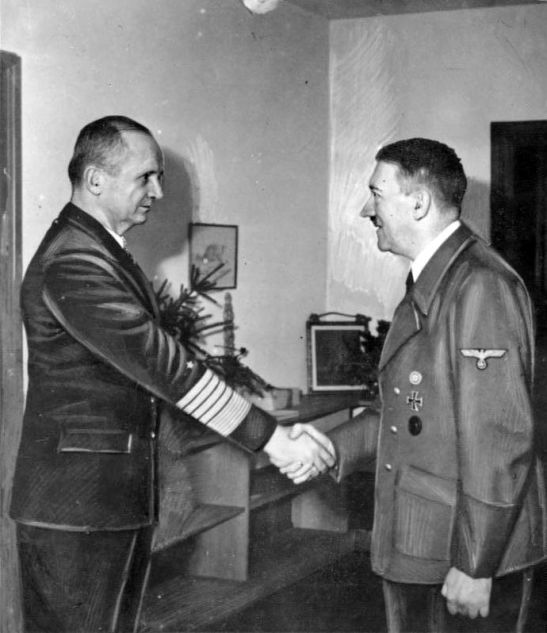Admiral Karl Dönitz achieved notable successes in the Second World War commanding German submarines. As a reward, Hitler appointed him to command the entire navy and then named him as his successor. It was this "benevolence" of the Führer that made Dönitz witness the disgrace of Germany and led him to Nuremberg.
Man of Courage or Gold Bricker?
Karl Dönitz was born on 16 September 1891 in Grünau near Berlin into the family of a Carl Zeiss optics engineer. Before he was four years old, his mother died, leaving his father with two sons.
After graduating from the Weimar Real Gymnasium in April 1910, Karl continued his studies at the naval schools of Kiel and Mürwik. From April 1910 until the end of March 1911, he served on the heavy cruiser SMS Hertha, and from 1 October 1912, he became a naval cadet on the light cruiser SMS Breslau. In September 1913, Dönitz was promoted to the rank of lieutenant.
At the beginning of the First World War, the battlecruiser SMS Goeben and the light cruiser SMS Breslau, which had slipped away from the British and French ships, escaped to Constantinople, where they were handed over to the Ottoman Empire along with their crews (the Turks renamed the ships Yavuz Sultan Selim and Midilli, respectively).
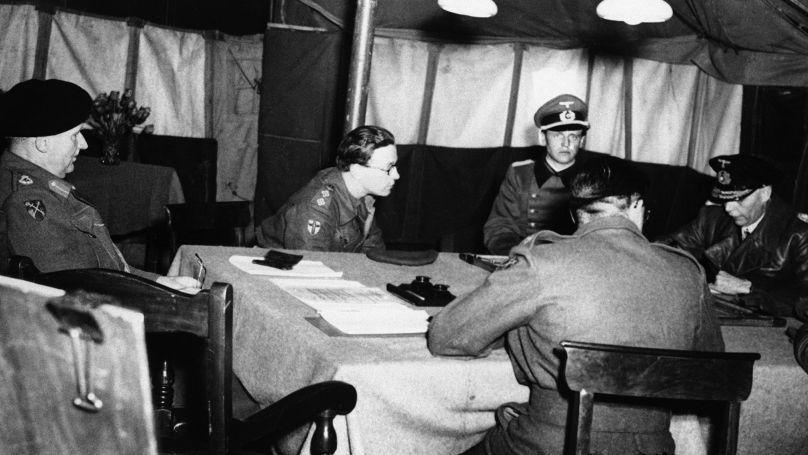
As early as November 1914, Dönitz received the Iron Cross, 2nd Class. His cruiser was active against the Russian Black Sea Fleet, but in July 1915 was hit by a mine. During the repair of the ship, Karl served as a gunner-observer in the air force and, on 12 September 1916, he was assigned to the air station serving the suburb of Constantinople, San Stefano, and the Dardanelles Strait.
In the same year, Dönitz married Major General Erich Weber's daughter Ingeborga, which placed him in a higher social status.
In December 1916, Dönitz arrived in Germany and retrained as a submarine officer. He served as an officer of the deck on the submarine U-39, and on 1 March 1918, he became commander of the UC-25. Under his command, the boat won four victories. Dönitz was then transferred to the UB-68 (type UB-III), on which he made one combat voyage.
On 3 October 1918, this submarine attacked a guarded convoy but in turn, was counterattacked by depth charges and surfaced. His submarine was shot by a ship's artillery, and the crew abandoned the vessel and surrendered. Dönitz tried to fake insanity to get home sooner.
A 'Secret' Captain
In July 1919, Dönitz returned from captivity and continued his service with the Reichsmarine. From 1920 to 1923 he commanded a destroyer, and in 1921 he rose to the rank of lieutenant-commander. Dönitz served as an adviser to the Submarine Fleet Department of the Navy Inspectorate from 1923, was the senior officer of the North Sea District Headquarters from 1930, and was the commander of the light cruiser Emden from 1934 to 1935. In September 1935 he became commander of the 1st German Submarine Flotilla Weddigen and in October 1939 he was promoted to the rank of "Kapitän zur See" (Captain at Sea).
When the Nazis came to power, Dönitz did not share their beliefs. But then he came "into full agreement with the concepts and aims of National Socialism", the US diplomat John Messerschmidt, whose testimony was read out at the Nuremberg trials, noted. By the time of 1936, German submarines under Dönitz' command took part in a secret operation during the Spanish Civil War, where Germany was supporting General Francisco Franco.
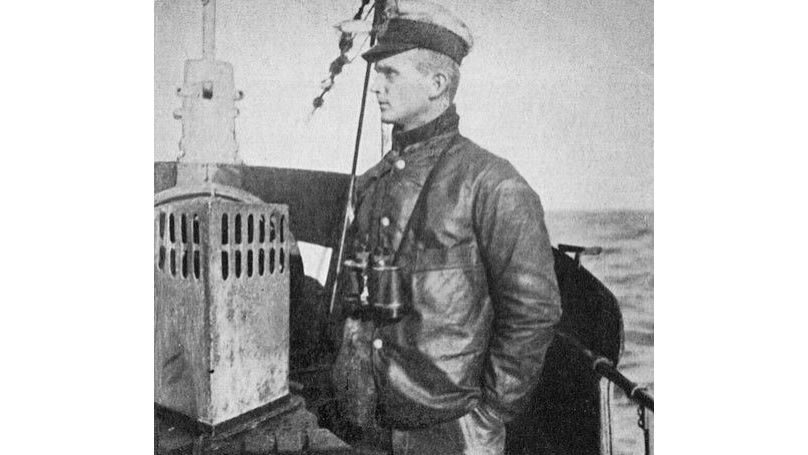
"He promoted preparations for war as set forth in the first count of the indictment", Sidney Alderman said, as he listed the charges against Dönitz. "He participated in the military planning and preparation of the Nazi conspirators for wars of aggression and wars in violation of international treaties, agreements, and assurances set forth in Counts One and Two of the Indictment; and he authorised, directed, and participated in the War Crimes set forth in Count Three of the Indictment, including particularly the crimes against persons and property on the High Seas".
"It was the Defendant Keitel and the Defendant Dönitz who were responsible for the alteration of the salute in the German forces and the adoption of the Nazi salute together with Goering", Barrister-at-Law Colonel Henry Phillimore, Junior Counsel for the United Kingdom, pointed out.
Submarine Führer
Dönitz was commander of the Kriegsmarine submarine fleet during the Second World War and became a Rear-Admiral on 1 October 1939.
He personally planned the operation against the British naval base at Scapa Flow in the Orkney Islands when, on 13-14 October 1939, the German submarine U-47 sailed into the harbour through the blocked Kirk Sound and sank the British battleship HMS Royal Oak with three torpedo salvos.
The fact that the maritime campaign was more successful underwater than on the surface also had an impact on Dönitz' promotion. He was awarded the Knight's Cross in April 1940, became a Vice-Admiral in September and a full Admiral in March 1942. In contrast to Grand Admiral Raeder, he felt the need to emphasise the development of the submarine fleet, which led to a conflict between the two naval commanders.
Germany was winning the "Battle of the Atlantic" against Britain, but on 11 December 1941 Hitler, having supported the Japanese attack on the American base Pearl Harbour in Hawaii, declared war on the USA. And the Germans were no match for the US Navy.
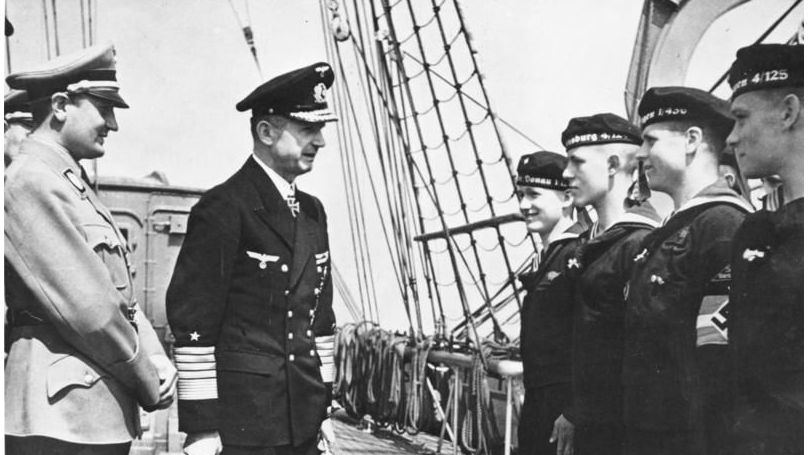
On 17 September 1942, Dönitz issued the infamous "Laconia Order" to the commanders of all Kriegsmarine submarines, which prohibited assistance to passengers and crew of sunken vessels by U-boats. This order was recounted at the trial by a prosecution witness, Kriegsmarine Oberleutnant zur See Peter Josef Heisig.
On 30 January 1943, following Raeder's resignation, Dönitz became Commander-in-Chief of the Kriegsmarine and was promoted to the rank of Grand Admiral. In March 1943, German submarines, acting in "wolf packs", sank 120 ships. Encouraged by this success, Hitler awarded him the Knight's Cross with Oak Leaves. But it was the last major success the Germans enjoyed at sea - from April 1943, the scales of the Battle of the Atlantic tilted more and more decisively in the favour of the Allies.
"…From the time that [Dönitz] succeeded, Raeder, this defendant was one of the rulers of the Reich and was undoubtedly aware of all decisions, major decisions of policy", Phillimore stressed.
On 30 January 1944, Hitler presented Dönitz with the Golden Party Badge of the NSDAP. On 12 March, the Grand Admiral stated in a radio address: "What would our home be today if the Führer had not united us under the rule of National Socialism? Torn into parties, imbued with the corrosive poison of Judaism, because our present uncompromising world picture was devoid of protection, we would have long since succumbed to the burden of war and been subjected to ruthless destruction by our adversaries".
At the time of the opening of the Second Front in Europe and the Allied landings in Normandy in June 1944, Dönitz ordered a final attack with a massive force. Thirty-six submarines were involved in the battle, but less than half survived. Yet Dönitz was not complacent. The Grand Admiral kept throwing more and more boats into battle, apparently hoping to turn the tide of the war. From 6 June to 31 August 1944, the Germans sank five escort ships, 12 cargo ships (58,845 tons) and four landing barges (8,400 tons), losing 82 submarines.
Hitler's Successor
On 30 April 1945, Adolf Hitler committed suicide. On the previous day, he had drawn up his political will and testament, in which he barred his official successor Hermann Göring and Reichsführer-SS Heinrich Himmler, Director of the Reich Main Security Office, of all powers and posts for attempted negotiations with western powers. He did not name a successor either as Führer or as head of the party but appointed Dönitz as Reich President, Reichsminister of Public Enlightenment and Propaganda Joseph Goebbels as Chancellor of the German Reich, and Head of the Nazi Party Chancellery Martin Bormann as Party Minister.
On 1 May, Dr Goebbels informed Stalin of Hitler's death and asked for a ceasefire. But the Soviet Union insisted only on unconditional surrender. The new Reich Chancellor, who had been in a state of deep despair for the past few months, reported to Dönitz what had happened and then took poison with his wife. They also murdered their six children who were minors.
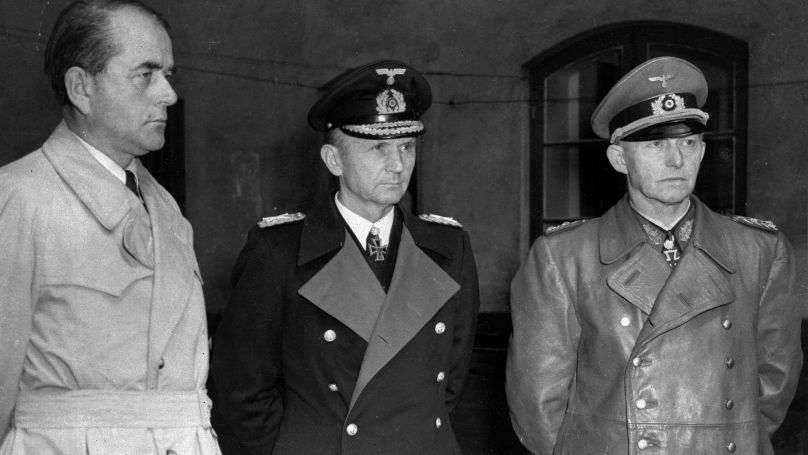
The new president of the German Reich was faced with a catastrophic situation: Berlin was taken by the Soviets and lay in ruins, the Americans and the British were rapidly advancing from the West, the leaders of the Reich were either dead, had been declared traitors, or had gone into hiding. All that remained was to end the war quickly and with fewer casualties.
On the night of 1-2 May 1945, Dönitz broadcast an “Appeal to the German People” in which he announced Hitler's "heroic death" and that the war would continue "in order to save Germany from destruction by the advancing Bolsheviks". But he was well aware that the most that could be hoped for was a separate peace with the Western powers.
On 2 May, Dönitz declared the building of the Naval Academy in Flensburg-Mürwik, north of Schleswig-Holstein, his residence. A new government was formed there, headed by the Minister of Finance, Graf Ludwig Schwerin von Krosigk, who refused to accept the post of Reich Chancellor and was referred to as the "Leading Minister". This cabinet went down in history as the "Flensburg Government". Its main objective was to establish an armistice with the Western powers and to evacuate as many troops and civilians as possible from territories which the Soviet Union could seize. On 6 May, Dönitz assigned the evacuation of civilians the highest priority and gave the fuel reserves of the submarines to this end. As a result, some 120,000 people were evacuated in two days.
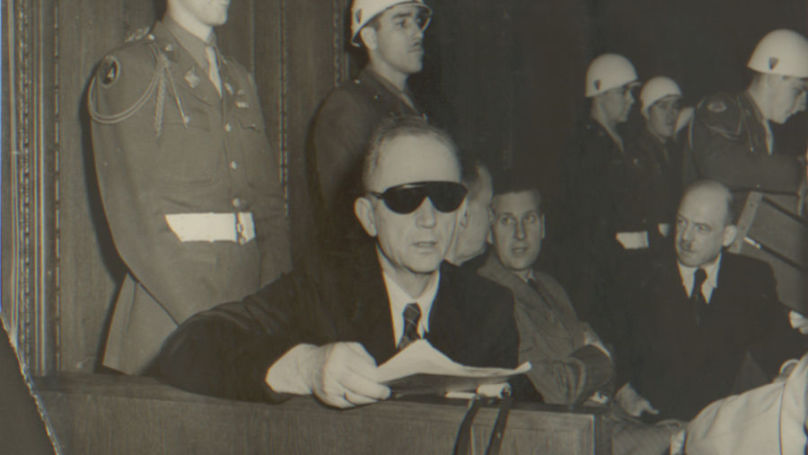
On 5 May, Dönitz sent the new Kriegsmarine Commander-in-Chief, Admiral Hans-Georg von Friedeburg, to US Army General Dwight Eisenhower at his headquarters in Reims, France, to begin negotiations for the surrender of Germany. The Reichspresident ordered that negotiations drag on as long as possible so that German troops and refugees could surrender specifically to the Western Allies. In response, Eisenhower threatened to close the front, which meant shooting any German soldiers who tried to cross the line. Upon news of this, Dönitz surrendered.
On 7 May, Dönitz's representatives signed the German Instrument of Surrender in Reims before representatives from Britain, the USA and the USSR. Stalin was not pleased that the Nazis surrendered on Allied territory and demanded a second surrender – now in Berlin, where the aggression had originated. On the night of 8 to 9 May, the military authorised by the Grand Admiral signed the final instrument of unconditional surrender in the Karlshorst district of the German capital.
Hopes for the Future
Nevertheless, Schwerin von Krosigk's cabinet continued to exist, and Dönitz even harboured hopes that it would become a provisional government for post-war Germany.
At Himmler's request, Dönitz instructed that members of the SS be issued with Kriegsmarine identity cards – it was clear that the SS would be prosecuted for war crimes in the first place. Likewise, he did not change his attitude towards the Nazi regime as a whole.
"The true national community created by National Socialism must be preserved; the madness of the parties, as existed before 1933, must not be repeated", Dönitz wrote just one week after the surrender. He insisted that what was happening in the concentration camps was not a state crime, but the responsibility of individuals.
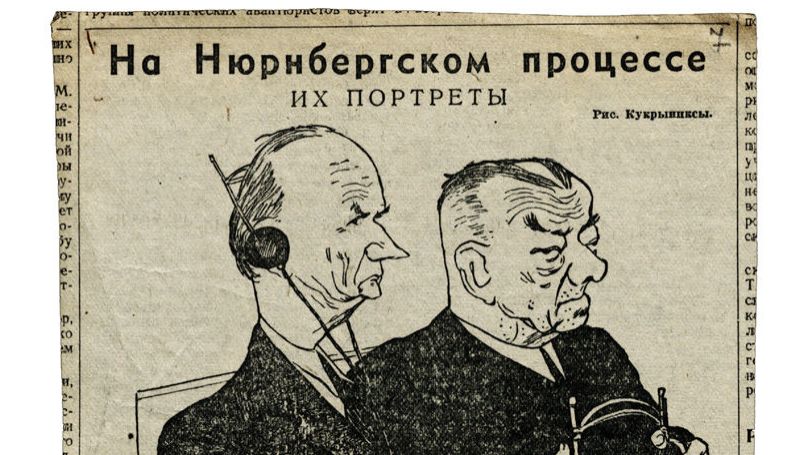
But the Allies were no longer troubled with him. On 20 May, the Soviet leadership officially called the Flensburg Government a "Dönitz Gang" and made it clear that it would never recognise its official status. On 23 May 1945, a British liaison officer arrived in Flensburg and read to the ministers the order of the American commander, General Dwight Eisenhower, to dissolve the Flensburg government and arrest all its members.
Later, Dönitz along with former ministers Albert Speer and Alfred Jodl were taken to Nuremberg, where they were put on trial. Perhaps Dönitz would have been able to keep himself out of the ranks of major Nazi criminals had he not been appointed Hitler's successor. But this "honour" bestowed by the Führer came back to haunt him.
The editors' team of the "Nuremberg: Casus Pacis" project express their gratitude to War Correspondent Ilya Kramnik for his assistance in preparing the material.
By Daniil SidorovSources:
Oleg Vishlev. Karl Dönitz // Great Russian Encyclopedia
Konstantin Zalessky. Leaders and military commanders of the Third Reich
Konstantin Zalessky. NSDAP. Power in the Third Reich
Andrey Gordienko. World War II commanders
Samuel William Mitchum Jr., Gene Mueller. Commanders of the Third Reich
